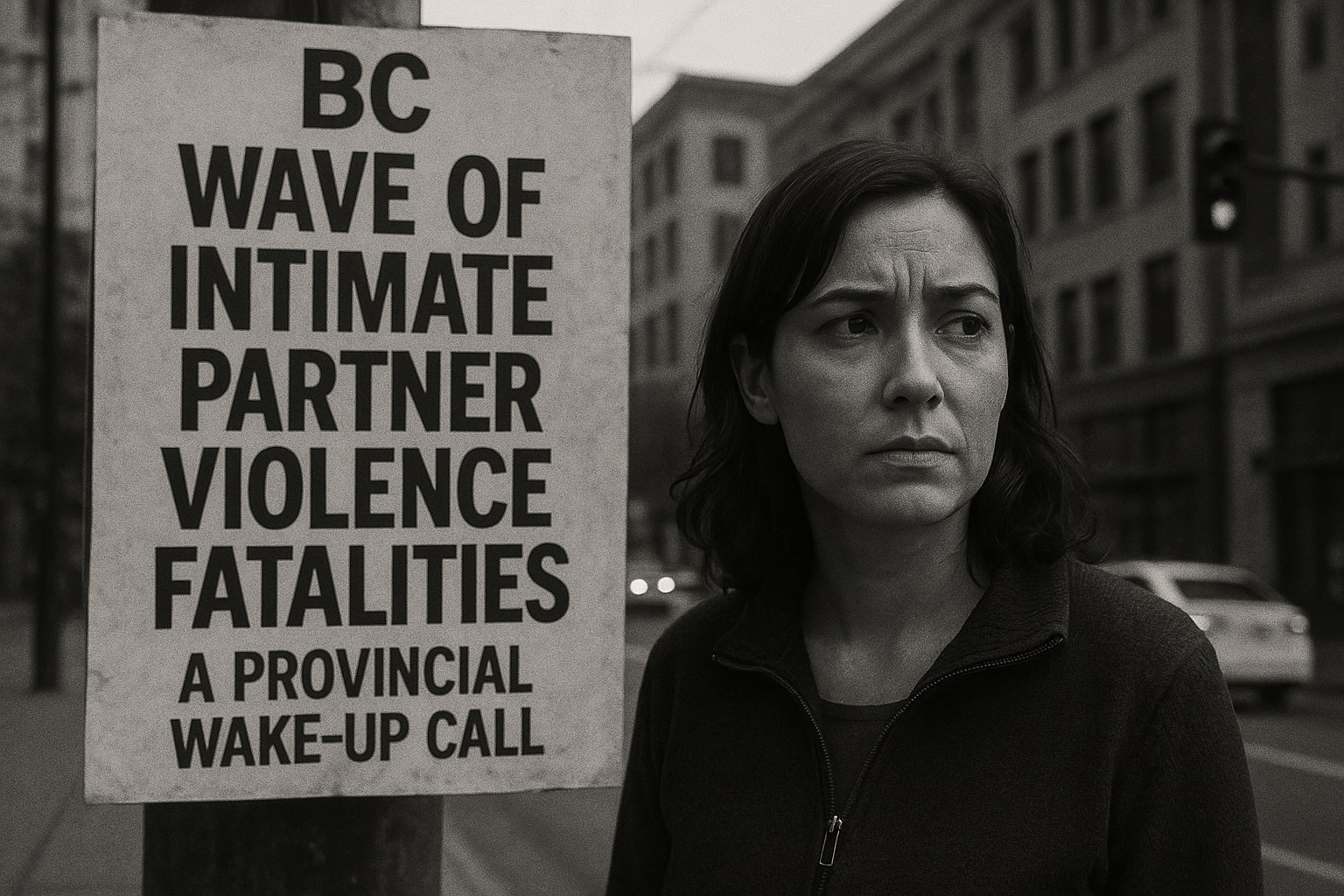📰 BC Faces Wave of Intimate Partner Violence Fatalities: A Provincial Wake-Up Call
BC recorded at least five IPV-related deaths in just a few weeks, sparking urgent calls from advocates to declare gender-based violence an epidemic.

British Columbia is reeling after a wave of intimate partner violence (IPV)-linked fatalities shocked communities across the province. In just a matter of weeks, five women were killed and at least three others critically injured by alleged partners or former partners.
These tragedies are more than isolated incidents — they are part of a growing pattern of gender-based violence (GBV) that experts say has reached epidemic proportions. Families, survivors, and advocates are united in grief and anger, demanding that BC take bold action to prevent more lives from being lost.
The Numbers That Shook BC
5 women killed in separate IPV-related incidents.
3 survivors critically injured, many left with long-term trauma.
Multiple children left without mothers, sparking widespread grief.
Vigils across Vancouver, Victoria, and Kelowna drew hundreds of residents in mourning and solidarity.
Each case left behind devastated families and communities, while the media spotlight highlighted systemic failures that have been raised for years but not fully addressed.
Why Fatalities Are Rising in BC
Experts and survivor advocates point to a combination of structural and systemic factors that create lethal conditions for survivors:
1. Housing Insecurity
With affordable housing scarce, many survivors are forced to stay with abusers or return after leaving shelters.
Long waitlists for transitional housing worsen the risk, leaving women with nowhere safe to go.
2. Bail and Probation Gaps
Repeat offenders are often released despite violent histories, with weak monitoring systems allowing them to continue harming survivors.
Survivors report restraining orders being violated with little consequence.
3. Underfunded Shelters
Many shelters operate at near or full capacity, turning survivors away nightly.
Limited staff and resources mean survivors cannot always access the protection they urgently need.
4. Ignored Recommendations
The Renfrew County Inquest (2022) issued 86 recommendations to prevent IPV-related deaths across Canada.
Many remain unimplemented in BC, despite repeated warnings that lives are at risk.
The Human Cost
Every fatality represents more than a statistic. Survivors, families, and communities are left with deep scars:
Children orphaned after losing their mothers.
Families of victims demanding accountability and reform.
Survivors retraumatized, fearing they could be next.
The ripple effects of IPV fatalities extend far beyond households, destabilizing entire communities and reinforcing cycles of trauma.
Community Response: Vigils and Advocacy
Across the province, communities are coming together to demand change.
Vigils & Rallies: Held in Vancouver, Victoria, and Kelowna, vigils honoured victims while rallies demanded provincial action.
Survivor Advocacy: Grassroots groups and survivor leaders renewed calls for BC to declare GBV an epidemic.
Family Voices: Relatives of victims publicly urged the government to enforce restraining orders more strictly and strengthen bail reform.
These events highlight the power of collective grief and anger — transforming mourning into advocacy for systemic change.
Why Declaring GBV an Epidemic Matters
Declaring GBV an epidemic is not symbolic alone — it is a policy tool that can:
Prioritize GBV in provincial funding and policy planning.
Unlock emergency funding for shelters, housing, and survivor services.
Mandate cross-agency coordination between police, healthcare, and community services.
Signal that BC recognizes GBV as a public health and safety crisis, not a private issue.
Conclusion
The recent spike in IPV fatalities in BC is a wake-up call: the province cannot afford to ignore gender-based violence any longer. Without urgent systemic reform, femicides will continue to rise, leaving more families devastated and more communities mourning preventable losses.
Declaring GBV an epidemic is not the final solution — but it is the first critical step toward coordinated, survivor-centered change. Until BC commits to stronger shelter funding, stricter offender accountability, and implementation of inquest recommendations, the cycle of violence will persist.
FAQs
1. How many IPV fatalities occurred recently in BC?
At least five women were killed within a matter of weeks.
2. What other injuries were reported?
At least three women were critically injured in IPV-related incidents.
3. What factors contribute to IPV fatalities?
Housing insecurity, weak bail and probation monitoring, underfunded shelters, and unimplemented inquest recommendations.
4. How have communities responded?
With vigils, rallies, survivor-led campaigns, and renewed demands for systemic reform.
5. What are families of victims demanding?
Stricter enforcement of restraining orders, bail reform, and recognition of GBV as an epidemic.
